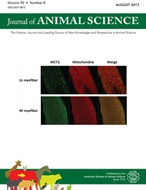-
Views
-
Cite
Cite
K. G. Friesen, J. L. Nelssen, R. D. Goodband, K. C. Behnke, L. J. Kats, The effect of moist extrusion of soy products on growth performance and nutrient utilization in the early-weaned pig,, Journal of Animal Science, Volume 71, Issue 8, August 1993, Pages 2099–2109, https://doi.org/10.2527/1993.7182099x
Close - Share Icon Share
Abstract
One hundred seventy pigs averaging 21 ± 1 d of age (initially 5.4 and 5.8 kg, respectively) were used in each of two experiments to determine the effect that further heat processing by moist extrusion has on the nutritional value of soybean products fed to the early-weaned pig (d 0 to 14 postweaning). The experiments were designed as randomized complete blocks with treatments arranged as a 2 × 3 factorial and a positive control. Main effects of moist extrusion and soy products and the interaction effects were analyzed. Raw soy flakes, commercial soy protein concentrate, and an experimental soy protein concentrate were used in Exp. 1 and a toasted soy flour replaced experimental soy protein concentrate in Exp. 2. A diet (1.4% lysine) containing primarily milk protein served as a positive control in both experiments. An interaction (P < .06) between moist extrusion processing and protein source existed from d 0 to 14 and from d 0 to 35 for ADG and gain:feed ratio (Exp. 1 and 2). Pigs fed moist-extruded soy products had improved (P < .01) ADG and gain:feed compared with pigs fed nonextruded soy products; the largest improvement was observed in pigs fed extruded, raw soy flakes and toasted soy flour (d 0 to 14). Apparent DM and N digestibilities (d 14) were increased (P < .05) when moist extrusion was used. Blood urea nitrogen and serum immunoglobulin G titers decreased (P < .05) in pigs fed moist-extruded soy products compared with titers in pigs fed nonextruded products. In Experiment 3, 100 pigs were used (initially 5.9 kg and 21 d of age) to compare moist and dry extrusion processing of soybean meal. Average daily gain, ADFI, gain:feed ratio, and apparent DM and N digestibilities were maximized (P < .05) in pigs fed a milk diet from d 0 to 14 postweaning. Pigs fed extruded soybean meal (moist or dry) had intermediate (P < .05) ADG, ADFI, gain:feed ratio, and apparent DM and N digestibilities from d 0 to 14. Pigs fed moist-extruded soybean meal from d 0 to 28 had increased (P < .10) ADG compared with pigs fed dry-extruded soybean meal. These data suggest that moist extrusion of less-refined soy products (raw soy flakes, toasted soy flour, and soybean meal) can result in growth performance comparable to that achieved by feeding highly refined soy products (soy protein concentrate) to the early-weaned pig.





